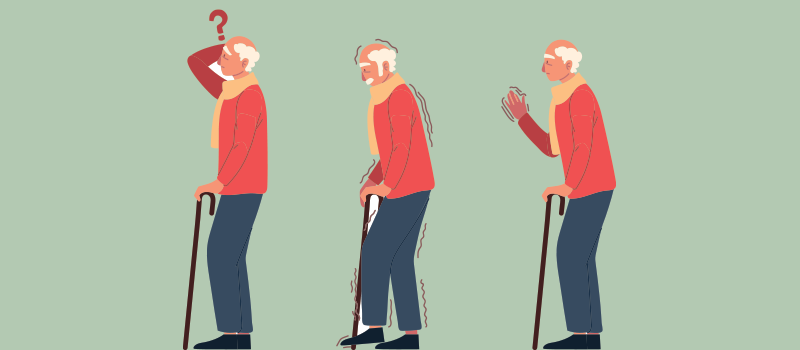What’s the Buzz
The Bee Healthy Blog
What Are Some Complications of Parkinson’s Disease?

Parkinson’s disease is one of the most common progressive degenerative neurological disorders. In this condition, neurons (brain cells) that make a chemical messenger called dopamine break down and die.
The exact reason for developing Parkinson’s disease is unknown, but environmental factors and genetic mutations are believed to play a role.
Common symptoms of Parkinson disease include slow movements, tremors, muscle rigidity, and balance problems. As Parkinson’s disease progresses, it can lead to severe motor and non-motor symptoms.
While there is no cure for the condition, doctors can treat Parkinson’s disease with medications such as dopamine agonists as well as treatments like deep brain stimulation.
In this article, we will talk about some movement-related symptoms of Parkinson’s disease as well as other complications of the condition.
What do Parkinson’s patients struggle with?
Some of the common symptoms of Parkinson’s disease are described below.
Chewing and Swallowing
Parkinson’s disease affects muscle and nerve cells and can result in a lack of coordination between the two. This can cause problems with chewing and swallowing as well as excess saliva production and drooling. As a result, food can get stuck in the throat. In advanced Parkinson’s disease, difficulty swallowing can lead to choking and passage of food into the lungs, which can cause pneumonia. Medications and speech-language therapy can help with these Parkinson’s-related problems.
Speech
Parkinson’s disease affects the pharyngeal (throat) muscles. This can make a person’s speech softer and more difficult to understand, thereby affecting the quality of life and daily living. In the later stages, changes in thinking ability can make communication even more difficult. Speech therapy can help people with Parkinson’s communicate more effectively.
Anxiety and Depression
A large number of people with Parkinson’s disease experience depression and anxiety. A chronic and debilitating condition such as Parkinson’s can lead to emotional changes. Parkinson’s disease also causes imbalances in neurotransmitters such as serotonin in the brain, which are associated with mood regulation. Untreated depression can make it harder for Parkinson’s patients and their family members to deal with the physical symptoms of the disease. Support groups, psychotherapy, and antidepressant medications can help relieve depressive symptoms.
Changes in Smell
One of the early symptoms of Parkinson’s disease is a reduced sense of smell. Researchers believe it is due to the formation of Lewy bodies in parts of the brain that control smell. A reduced sense of smell is considered one of the risk factors for Parkinson’s.
Parkinson’s Disease Dementia
Parkinson’s disease is primarily a movement disorder but also affects brain cells that control thoughts and memories. Abnormal deposits of protein alpha-synuclein in the brain called Lewy bodies are frequently seen in Parkinson’s patients. Approximately 50-80% of people with Parkinson’s develop dementia with cognitive problems such as poor judgment, memory problems, trouble concentrating, delusions, and hallucinations. Medication can help slow the progress of Parkinson’s dementia, but the symptoms usually worsen as the disease progresses.
Sleep Disorders
People with Parkinson’s disease often suffer from sleep disorders such as insomnia, nightmares, vivid dreams, REM sleep disorder (acting out dreams), sleep apnea, restless legs syndrome, nocturia (frequent urination at night), and daytime sleepiness. Possible reasons for sleep problems in Parkinson’s patients include physical discomfort during sleep, changes in brain chemistry, and the effects of Parkinson’s and other medications. A sleep specialist can diagnose these conditions and offer appropriate treatments.
Fatigue
Muscle weakness and sleep problems can lead to severe exhaustion in people with Parkinson’s disease, making it difficult to get out of bed. Getting enough rest in the daytime and taking Parkinson’s medications as prescribed can help with fatigue.
Bowel and Bladder Problems
Problems with the autonomic nervous system (signaling between the bowels/bladder and the brain), muscle weakness, and medication side effects in Parkinson’s patients can lead to a range of bowel and urinary problems. Symptoms may include urge incontinence, stress incontinence, overactive bladder, frequency of urination, weak urinary stream, constipation, diarrhea, and fecal incontinence. Lifestyle changes and medications can help to manage these symptoms.
Pain
Up to 8 out of 10 people diagnosed with Parkinson’s disease experience pain. This can be due to muscle contractions as well as abnormal pain signals in the brain. Levodopa, the medication used to manage Parkinson’s symptoms, can help relieve the muscle spasms that trigger pain. Doctors can also prescribe physical therapy and pain medications. Gentle exercises such as yoga and tai-chi may also help.
Dyskinesia
Treatments for Parkinson’s disease, such as levodopa therapy, cause fluctuating levels of dopamine in the brain. This can lead to involuntary and uncontrolled movements called dyskinesia, including twitching, fidgeting, swaying, and head shaking. Dyskinesia is more likely with high doses or prolonged treatment with Parkinson’s medications. Changing the dose or taking an extended-release formulation of levodopa can help prevent this complication of Parkinson’s disease.
Changes in Blood Pressure
According to the National Parkinson Foundation, approximately 20% of people with Parkinson’s disease experience low blood pressure, specifically orthostatic hypotension (a sudden drop in blood pressure that causes you to feel dizzy when standing up from a seated or lying position). This can put a person at risk of falls. Postural hypotension can occur due to Parkinson’s effect on the autonomic nervous system (internal blood pressure regulating mechanism) or as a side effect of some Parkinson’s medications. Ensuring enough fluid intake, arising slowly from a sitting or lying position, and making adjustments in medications can help to relieve this symptom.
Sexual Dysfunction
Parkinson’s disease causes nerve damage. This can make it difficult for men to get an erection and cause vaginal dryness in women. Men and women may also experience reduced sensations in the genitals. The stiff or jerking movements as a result of Parkinson’s can make sexual activity challenging. Falling dopamine levels can affect a person’s libido (sex drive). Fatigue, depression, and anxiety can further reduce energy levels and interest in sex. Medications to treat Parkinson’s and other symptoms, lubrication for women, erectile dysfunction medications and treatments for men, and counseling are possible treatment options for sexual dysfunction in people with Parkinson’s disease.
What are the motor complications of Parkinson's disease?
The three main motor symptoms of Parkinson's disease are tremors, rigidity (stiffness), and slowed movements.
What are the final stages of Parkinson’s disease?
The final stages of Parkinson’s disease, also called stage five, are associated with severe motor and non-motor symptoms. Advanced stiffness and freezing can make it impossible for a person to walk. Postural problems in the neck, back, and hips can cause a person in the later stages of Parkinson’s disease to require a wheelchair or become bedridden. Besides mobility problems, there can be increasing swallowing and speech problems. Mental health symptoms such as depression, anxiety, delusions, hallucinations, and dementia may also worsen.
How long does the final stage of Parkinson's last?
There is no fixed timeline for the final stage of Parkinson's disease. People with Parkinson’s disease are usually offered hospice care when their life expectancy is six months or less.
What are the complications of Parkinson's disease that cause death?
Many people wonder if you can die from Parkinson’s disease. The answer is no. Parkinson’s disease itself is not fatal. However, people with Parkinson’s disease can experience progressively worsening symptoms before passing away.
Two major causes of death in people with Parkinson’s disease are falls and pneumonia. Serious falls may require surgery and other treatments, which puts a person at risk of other complications like blood clots, infections, anesthesia-related complications, and heart failure, any of which can lead to death.
References:








SOCIAL